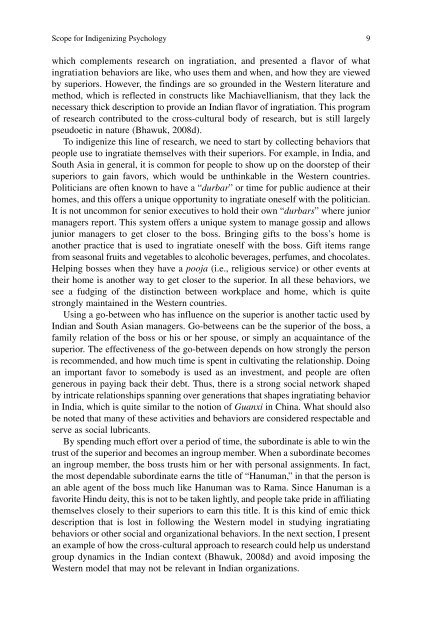Spirituality and Indian Psychology: Lessons from ... - Mandhata Global
Spirituality and Indian Psychology: Lessons from ... - Mandhata Global
Spirituality and Indian Psychology: Lessons from ... - Mandhata Global
Create successful ePaper yourself
Turn your PDF publications into a flip-book with our unique Google optimized e-Paper software.
Scope for Indigenizing <strong>Psychology</strong><br />
which complements research on ingratiation, <strong>and</strong> presented a flavor of what<br />
ingratiation behaviors are like, who uses them <strong>and</strong> when, <strong>and</strong> how they are viewed<br />
by superiors. However, the findings are so grounded in the Western literature <strong>and</strong><br />
method, which is reflected in constructs like Machiavellianism, that they lack the<br />
necessary thick description to provide an <strong>Indian</strong> flavor of ingratiation. This program<br />
of research contributed to the cross-cultural body of research, but is still largely<br />
pseudoetic in nature (Bhawuk, 2008d).<br />
To indigenize this line of research, we need to start by collecting behaviors that<br />
people use to ingratiate themselves with their superiors. For example, in India, <strong>and</strong><br />
South Asia in general, it is common for people to show up on the doorstep of their<br />
superiors to gain favors, which would be unthinkable in the Western countries.<br />
Politicians are often known to have a “durbar” or time for public audience at their<br />
homes, <strong>and</strong> this offers a unique opportunity to ingratiate oneself with the politician.<br />
It is not uncommon for senior executives to hold their own “durbars” where junior<br />
managers report. This system offers a unique system to manage gossip <strong>and</strong> allows<br />
junior managers to get closer to the boss. Bringing gifts to the boss’s home is<br />
another practice that is used to ingratiate oneself with the boss. Gift items range<br />
<strong>from</strong> seasonal fruits <strong>and</strong> vegetables to alcoholic beverages, perfumes, <strong>and</strong> chocolates.<br />
Helping bosses when they have a pooja (i.e., religious service) or other events at<br />
their home is another way to get closer to the superior. In all these behaviors, we<br />
see a fudging of the distinction between workplace <strong>and</strong> home, which is quite<br />
strongly maintained in the Western countries.<br />
Using a go-between who has influence on the superior is another tactic used by<br />
<strong>Indian</strong> <strong>and</strong> South Asian managers. Go-betweens can be the superior of the boss, a<br />
family relation of the boss or his or her spouse, or simply an acquaintance of the<br />
superior. The effectiveness of the go-between depends on how strongly the person<br />
is recommended, <strong>and</strong> how much time is spent in cultivating the relationship. Doing<br />
an important favor to somebody is used as an investment, <strong>and</strong> people are often<br />
generous in paying back their debt. Thus, there is a strong social network shaped<br />
by intricate relationships spanning over generations that shapes ingratiating behavior<br />
in India, which is quite similar to the notion of Guanxi in China. What should also<br />
be noted that many of these activities <strong>and</strong> behaviors are considered respectable <strong>and</strong><br />
serve as social lubricants.<br />
By spending much effort over a period of time, the subordinate is able to win the<br />
trust of the superior <strong>and</strong> becomes an ingroup member. When a subordinate becomes<br />
an ingroup member, the boss trusts him or her with personal assignments. In fact,<br />
the most dependable subordinate earns the title of “Hanuman,” in that the person is<br />
an able agent of the boss much like Hanuman was to Rama. Since Hanuman is a<br />
favorite Hindu deity, this is not to be taken lightly, <strong>and</strong> people take pride in affiliating<br />
themselves closely to their superiors to earn this title. It is this kind of emic thick<br />
description that is lost in following the Western model in studying ingratiating<br />
behaviors or other social <strong>and</strong> organizational behaviors. In the next section, I present<br />
an example of how the cross-cultural approach to research could help us underst<strong>and</strong><br />
group dynamics in the <strong>Indian</strong> context (Bhawuk, 2008d) <strong>and</strong> avoid imposing the<br />
Western model that may not be relevant in <strong>Indian</strong> organizations.<br />
9

















